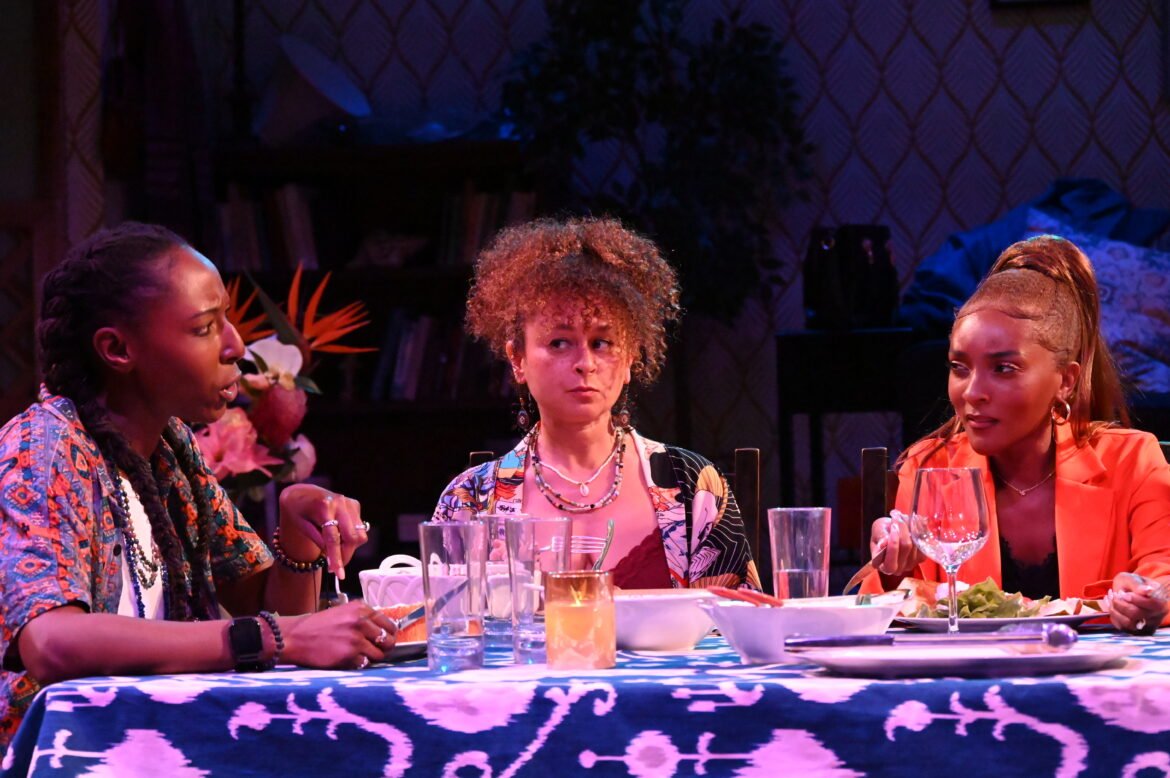AeJay: Aww, I love that river imagery! Thank you. Absolutely. Yeah. I think for an artist to be able to do their best and most brave work, they need to have full access to all of themselves and not feel a necessity to break themselves into pieces—to negotiate what parts of themselves they must leave outside.
Something that I crave when I’m working as an actor is a place where I can freely be in dialogue with all the creative members of the team, a place that is basking in the fountains of knowledge and geysers of experience in the room—to continue your water theme—that can lead to collaborative and dynamic works of art.
As to my experience with Josephine’s Feast, in particular, I was able to enter as a contractor, not beholden to the board or the company in a way that prioritizes hierarchical chains of command. I am not there to make sure that the company comes out on top—in ways that Human Resources (HR) can be at times. I am there as a visual reminder of a room’s commitment to each individual artist’s dreams, skills, and humanity.
Yeah, so a lot of my work is sitting with and listening to an artist’s verbal and non-verbal needs in space. There would be times, during a lunch break, where a team member would come to me and ask, “Can we just talk for a second or take a walk?” During those moments, more often than not, we did not talk about what was happening in the rehearsal room, but things that are weighing on them personally, or joys in which they were currently experiencing. At times, they wanted me to be a sounding board for an idea they were trying to work out for the project or to join them in nervous system regulation exercises.
I would often say that I am the person in the room whose job is to focus on everyone’s needs as humans first. I hold no expectations or asks of one’s artistry. I don’t need you to learn lines or have a concept. I don’t need you to write cues or set props backstage. I don’t need a budget update or a front of house report. I simply need to know that everyone has access to creating from a mindset of abundance—that whispering voice in the room asking have you eaten, are you hydrated, are you good, have you had fresh air, are you thriving in this room, do you need a walk and talk, are we in need of a non-scheduled breath break as humans, are you, the individual, okay? There is no glory in worn down artists.
Star: I recall you bringing food on multiple occasions, or offering the invitation: “Does anybody want to go outside with me?” And it was just… I guess you reminded me how rare it is to have someone show up for you as another human being outside of a friendship or a romantic relationship. Gentle attentiveness is hard to come by once you age out of childhood. And it’s extremely unlikely for adults to engage from that angle within a pressured work environment; to say, “I’m here to center your humanity with my humanity” is a beautiful thing.
We are exhausted because conversations around EDI often position the caring of artists as this impossible task, a series of slow changes that will take as long as species evolution itself—thousands of years! What a bore.
AeJay: Thank you. Yeah, I agree. I have been in artistic situations where everyone’s in isolation and everyone’s choking and drowning and being smothered by the expectations of whatever that work was. And no one was coming in just to say, “Do you need to take a break? Do you need something? Can I get you something? Here is something.” We are just expected to know how to regulate because we are adults, as though we are not water, flesh, bones, and blood—easily broken.
To go back to our agreed upon feelings of “ick” when we hear the phrase EDI initiative for a moment—I believe folks of historically and intentionally excluded voices and identities are exhausted by the think tanks and the statements of baseless solidarity and the twelve-point policies towards the future in which one day we shall all be free, hallelujah! We are exhausted because conversations around EDI often position the caring of artists as this impossible task, a series of slow changes that will take as long as species evolution itself—thousands of years! What a bore. I feel, and perhaps you agree, there are really clear, accessible routes to making people feel at home and seen in a space, and that first route is mostly asking what they need, while providing examples of what can be offered.
It seems so intuitive. Yeah, just ask people what they need, but there’s so many moments when folks are talking about EDI and it’s so full of verbose language—“we are committed wholeheartedly to blah, blah, blah.” However, the question becomes how are these intentions being held in this space right now?
My voice in the room is an active and open challenge to “business as usual” practices that do not serve the voiced needs in a space. And if someone’s not feeling great, how do I help get the resources they need to move forward?
We are trying to drag EDI out of the theoretical. I believe the theatre can be a model for a world in which everyone’s needs are met.
Star: We both half joke/half dream about a fully funded theatre world where there could be a team of therapists on staff to provide mental health services for audiences and actors who might be in crisis. I’m curious about what other visions you hold around the possible functions for theatre spaces within community—specifically in a new world that we desperately want to manifest?

